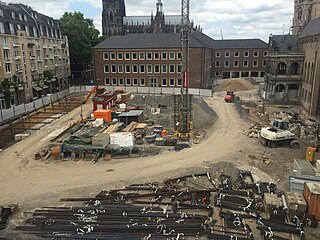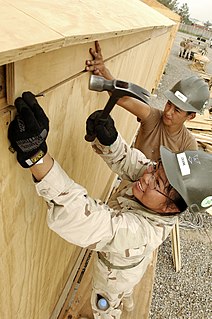
Construction is a general term meaning the art and science to form objects, systems, or organizations, and comes from Latin constructio and Old French construction. To construct is the verb: the act of building, and the noun is construction: how something is built, the nature of its structure.

Professional diving is underwater diving where the divers are paid for their work. The procedures are often regulated by legislation and codes of practice as it is an inherently hazardous occupation and the diver works as a member of a team. Due to the dangerous nature of some professional diving operations, specialized equipment such as an on-site hyperbaric chamber and diver-to-surface communication system is often required by law, and the mode of diving for some applications may be regulated.

The National Institute for Occupational Safety and Health is the United States federal agency responsible for conducting research and making recommendations for the prevention of work-related injury and illness. NIOSH is part of the Centers for Disease Control and Prevention (CDC) within the U.S. Department of Health and Human Services. Despite its name, it is not part of the National Institutes of Health. Its current director is John Howard.

Dangerous goods, abbreviated DG, are substances that when transported are a risk to health, safety, property or the environment. Certain dangerous goods that pose risks even when not being transported are known as hazardous materials.
This article gives detailed information on the employment situation in Hong Kong.

The Ministry of Health is the public service department of New Zealand responsible for healthcare in New Zealand. It came into existence in its current form in 1993.
Workers' Memorial Day, also known as International Workers' Memorial Day or International Commemoration Day for Dead and Injured, takes place annually around the world on April 28, an international day of remembrance and action for workers killed, disabled, injured, or made unwell by their work. In Canada, it is commemorated as the National Day of Mourning.

Hazards is an independent, award-winning occupational safety and health magazine. Published quarterly, it is the trade union recommended magazine for UK union health and safety representatives. Hazards has also jointly developed a NewsWire with LabourStart which provides health and safety news headlines for union websites as an RSS feed.

Thomson Reuters Corporation is a Canadian multinational media conglomerate. The company was founded in Toronto, Ontario, Canada, where it is headquartered at the Bay Adelaide Centre.
The Ministry of Labour & Employment is one of the oldest and most important Ministries of the Government of India. This is an India's federal ministry which is responsible to protect and safeguard the interest of workers in general and their social security. The Ministry aims to create a healthy work environment for higher production and productivity and to develop and coordinate vocational skill training and employment. However, Skill Development responsibilities, such as Industrial Training and Apprenticeship responsibilities were transferred to the Ministry of Skill Development and Entrepreneurship from 9 November 2014. The Ministry launched the National Career Service portal on 20 July 2015 to help bridge the gap between job providers and job seekers.

A physical hazard is an agent, factor or circumstance that can cause harm with contact. They can be classified as type of occupational hazard or environmental hazard. Physical hazards include ergonomic hazards, radiation, heat and cold stress, vibration hazards, and noise hazards. Engineering controls are often used to mitigate physical hazards.

Occupational safety and health (OSH), also commonly referred to as occupational health and safety (OHS), occupational health, or occupational safety, is a multidisciplinary field concerned with the safety, health, and welfare of people at occupation. These terms also refer to the goals of this field, so their use in the sense of this article was originally an abbreviation of occupational safety and health program/department etc.

EHS Today is an American occupational safety and health magazine. Published monthly by Endeavor Business Media, it is the leading US magazine for environmental, health and safety management professionals in the manufacturing, construction, and service sectors.

Nuclear labor issues exist within the international nuclear power industry and the nuclear weapons production sector worldwide, impacting upon the lives and health of laborers, itinerant workers and their families.
Diving regulations are the stipulations of the delegated legislation regarding the practice of underwater diving. They apply within the national territory and territorial waters of a country. In most cases they apply to occupational diving, but in a few cases also to recreational diving. There are exemptions for recreational diving in some cases where it is recognised as a self-regulated industry. Offshore diving is generally outside the scope of diving regulations, and tends to be self-regulated through voluntary membership of industry organisations.
The National Institute for Safety and Health at Work is an autonomous agency of the Government of Spain. The INSST is considered a technical-scientific agency entrusted with the task of analyze and research on safety and health conditions at work, as well of promoting and supporting the improvement of them, in order to achieve a decrease in occupational hazards, work accidents and occupational diseases.
The right to sit refers to laws or policies granting workers the right to be granted suitable seating at the workplace. Jurisdictions that have enshrined "right to sit" laws or policies include the United Kingdom, Jamaica, South Africa, Eswatini, Tanzania, Uganda, Lesotho, Malaysia, Brazil, Israel, Ireland, the Indian states of Tamil Nadu and Kerala, the Canadian province of Newfoundland and Labrador, and the British overseas territory of Gibraltar and Montserrat. Almost all states of the United States and Australia, as well as the majority of Canadian provinces passed right to sit legislation for women workers between 1881 and 1917. US states with current right to sit legislation include California, Florida, Massachusetts, Montana, New Jersey, New Mexico, New York, Oregon, Pennsylvania, West Virginia, and Wisconsin. A right to sit provision is included in the International Labour Organization's Hygiene Convention, 1964; the convention being ratified by 51 countries as of 2014. Local jurisdictions with right to sit laws include Portland, Oregon, St. Louis, Missouri and London's Royal Borough of Kensington and Chelsea. Some jurisdictions, such as Alabama, Arkansas, Connecticut, Idaho, Kentucky, Maine, Michigan, Missouri, Nevada, New Hampshire, Quebec, and Washington, D.C. have revoked their right to sit laws. Many right to sit laws originally contained gendered language specifying women workers only. Some jurisdictions maintain gendered laws, but many jurisdictions have amended their right to sit laws to be gender neutral.











